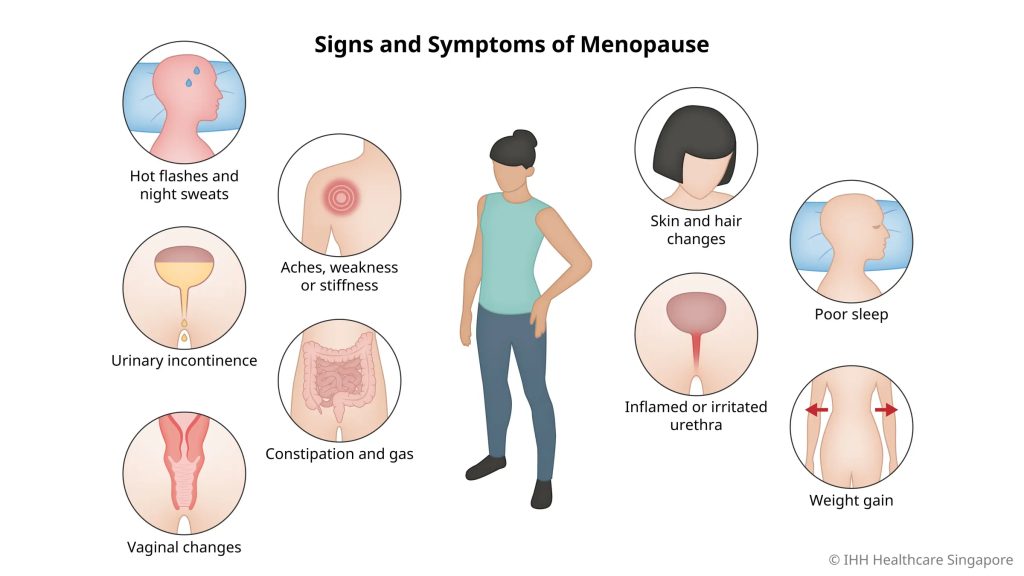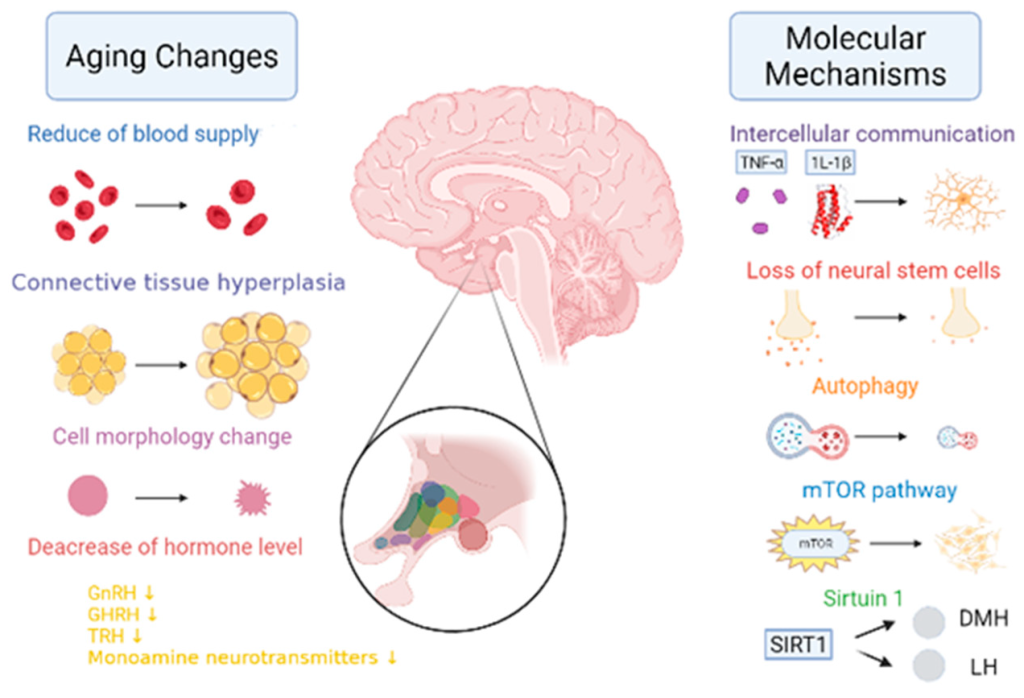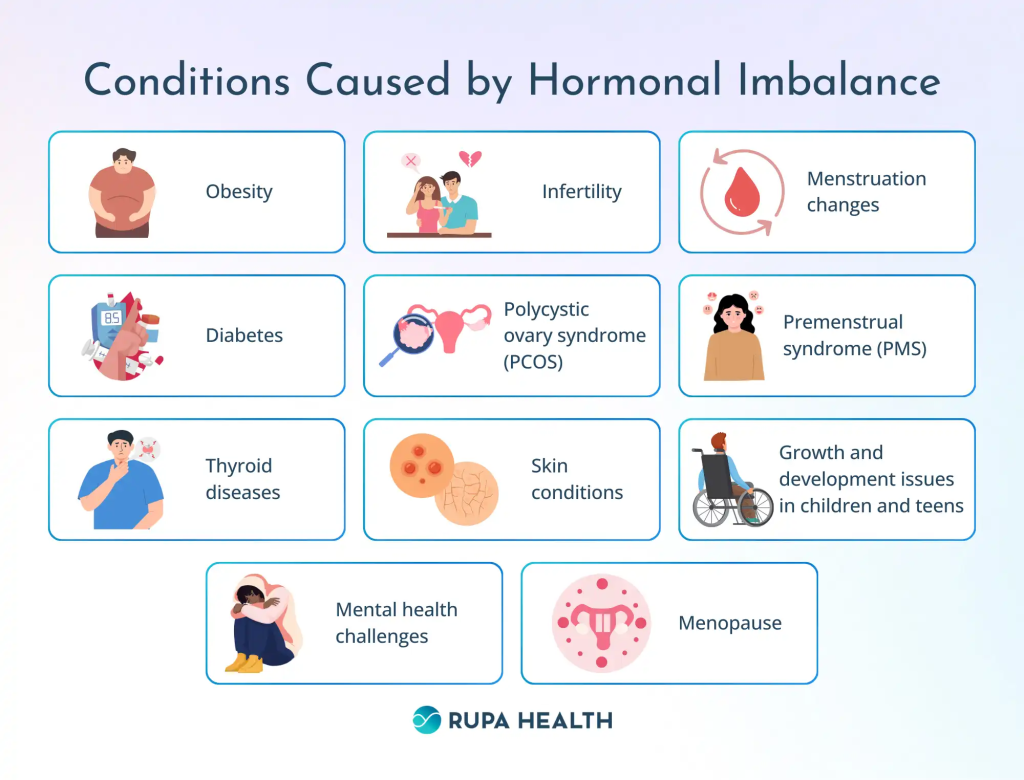Introduction to Hormonal Changes and Aging

[Source: vibrancemedspa.com]
The relationship between hormones and aging presents a fascinating biological process that affects every woman differently. Your body operates through an intricate network called the endocrine system, which serves as the command center for hormone production and regulation [#1]. This system plays a vital role in maintaining various bodily functions, from metabolism to sexual health, and even influences your emotional well-being.
Overview of Hormonal Changes in Women
As you progress through different life stages, your hormone levels naturally shift and adjust. These fluctuations don’t follow a simple pattern – some hormones increase while others decrease, creating a complex dance of biological processes . Understanding these changes becomes crucial, especially since they can significantly impact how your body ages and responds to various health challenges.
Women face distinct hormonal shifts throughout their lives, from puberty through reproductive years and into menopause. These changes can affect everything from skin elasticity to bone density, making it essential to recognize early signs of hormonal imbalances that might accelerate aging. Similar to how hormones influence your weight management journey, they also play a crucial role in how your body ages.
Impact of Hormones on Aging
The aging process involves multiple hormonal pathways working simultaneously. Your body’s response to these changes can either support healthy aging or potentially speed up age-related concerns. Much like how royal health protocols emphasize preventive care, understanding your hormonal health early on can help you take proactive steps to maintain your vitality.
These hormonal fluctuations affect various aspects of your health, including:
- Skin elasticity and collagen production
- Bone density and muscle mass
- Energy levels and metabolism
- Mood and cognitive function
- Sleep patterns and quality
Understanding Menopause and Its Variants

[Source: gleneagles.com.sg]
What is Menopause?
Menopause marks a significant transition in a woman’s life, typically occurring around age 50, when the ovaries gradually decrease their production of estrogen and progesterone . This natural biological process signals the end of reproductive years and brings various physical and emotional changes.
Premature and Early Menopause
While menopause is a natural part of aging, some women experience it earlier than expected. Medical professionals distinguish between two types of accelerated menopause:
- Premature menopause: Occurs before age 40 [#2]
- Early menopause: Happens between ages 40-45
Symptoms and Causes of Early Menopause
Several factors can trigger premature or early menopause. Understanding these triggers helps women recognize and address potential risks. Common causes include:
- Medical treatments: Chemotherapy and radiation
- Surgical procedures affecting reproductive organs
- Genetic factors: Family history and chromosomal abnormalities
- Health conditions: Autoimmune diseases
- Lifestyle factors: Smoking
- Infections affecting reproductive health
Just as hormones affect various bodily functions differently in men and women, the timing and impact of menopause can vary significantly among individuals. Recognizing these variations helps in developing appropriate medical responses and lifestyle adjustments.
Hormonal Axes and Their Role in Aging

[Source: mdpi.com]
Gonadotropic Axis
The gonadotropic axis plays a central role in female aging, particularly during menopause. As women age, significant changes occur in hormone levels, with follicle-stimulating hormone (FSH) and luteinizing hormone (LH) showing marked increases [#3]. These elevations often signal the decline in ovarian function and contribute to various aging-related symptoms.
Somatotropic Axis
The somatotropic axis, responsible for growth and development, undergoes substantial changes with age. Growth hormone levels typically decrease as we get older, affecting multiple bodily functions . This reduction can impact:
- Body composition and fat distribution
- Muscle mass maintenance
- Bone density preservation
- Metabolic rate regulation
Thyrotropic Axis
The thyrotropic axis maintains metabolic balance through thyroid hormone regulation. While thyroid function generally remains stable with age, subtle changes can occur. These alterations may affect energy levels, weight management, and cellular metabolism. Similar to how trans fats impact metabolic health, thyroid hormone imbalances can influence how the body processes nutrients and maintains energy balance.
Corticotropic Axis
Age-related changes in the corticotropic axis affect stress response and inflammation control. This system experiences several modifications:
- Altered cortisol patterns
- Changes in stress hormone production
- Modifications in inflammatory responses
- Variations in immune system function
These changes can affect how the body manages stress and maintains its lymphatic system health, potentially accelerating the aging process.
Health Implications of Hormonal Changes

[Source: rupahealth.com]
Risks Associated with Premature Menopause
The health consequences of hormonal changes, particularly in premature menopause, extend far beyond the commonly known symptoms. Women experiencing early hormonal shifts face increased health risks that require careful attention. Much like how your nails can reveal underlying health conditions, hormonal changes manifest through various physical indicators that shouldn’t be ignored.
Research shows that women going through menopause face elevated risks of several serious health conditions [#4]. These include:
- Heart disease and stroke
- Dementia
- Osteoporosis
- Cardiovascular complications
Impact on Lifespan and Health Status
The relationship between hormonal changes and cardiovascular health is particularly significant. After menopause, women experience an increased risk of heart and blood vessel disease [#5]. This risk becomes even more pronounced in cases of premature or early menopause .
The metabolic changes that occur during this period can affect various aspects of health. Similar to the bodys response when you stop eating bread, hormonal fluctuations can trigger significant changes in:
- Bone density and strength
- Cardiovascular function
- Cognitive performance
- Metabolic rate
- Overall physical resilience
Management and Treatment Options

[Source: shecares.com]
Hormone Replacement Therapy
Managing hormonal changes requires a balanced approach to treatment. The medical community has developed specific guidelines for hormone replacement therapy (HRT), which remains a primary treatment option. The U.S. Food and Drug Administration advocates for a minimalist approach, recommending women use the lowest effective dose for the shortest necessary duration .
For women experiencing early menopause, HRT often becomes a necessary intervention, similar to how we manage other bodily discomforts. Medical professionals typically prescribe HRT unless specific health conditions prevent its use . The treatment usually involves:
- Estrogen supplementation
- Progesterone therapy when needed
- Regular monitoring of hormone levels
- Adjustment of dosage based on symptoms
Lifestyle and Preventive Measures
Beyond medical interventions, lifestyle modifications play a crucial role in managing hormonal changes. Current guidelines support combining short-term hormone therapy with healthy lifestyle practices . These lifestyle adjustments include:
- Regular physical activity to maintain bone density
- Balanced nutrition rich in calcium and vitamin D
- Stress management techniques
- Adequate sleep hygiene
- Regular health screenings
Weight management becomes particularly important during this phase. While hormonal changes can affect metabolism, maintaining a healthy weight through proper nutrition and exercise helps minimize symptoms. Just as there are ways to shed pounds without traditional methods, women can explore various approaches to maintain their well-being during this transition.
Pain management might become necessary for some women experiencing joint discomfort or headaches during hormonal transitions. Natural pain relief methods can complement medical treatments, offering additional comfort without relying solely on medication.
Conclusion
Summary of Key Points
Hormonal changes significantly influence the aging process in women, with various endocrine axes playing crucial roles. Understanding these biological mechanisms helps women make informed decisions about their health management strategies. The impact of premature hormonal aging extends beyond physical symptoms, affecting overall quality of life and long-term health outcomes.
Research consistently shows that early intervention and proper management of hormonal imbalances can help minimize adverse effects. Women experiencing premature menopause or early hormonal changes benefit from:
- Comprehensive hormone replacement therapy when appropriate
- Regular medical monitoring and adjustments
- Lifestyle modifications that support hormonal balance
- Preventive measures against associated health risks
Future Directions in Research and Treatment
Medical science continues to advance our understanding of hormonal aging. Emerging research focuses on developing more targeted treatments and identifying early markers of premature aging. Similar to how certain habits affect metabolism, researchers are discovering new connections between lifestyle factors and hormonal health.
The future of hormone therapy looks promising, with personalized medicine approaches gaining momentum. Scientists are exploring new delivery methods, bioidentical hormones, and complementary treatments. These advancements, combined with proper nutrition and regular exercise – much like strategies for maintaining a healthy weight – offer hope for better management of age-related hormonal changes.
Women facing hormonal challenges today have more options than ever before. By staying informed about treatment options and maintaining open communication with healthcare providers, they can develop effective strategies to address their specific needs and maintain optimal health throughout their hormonal transition journey.